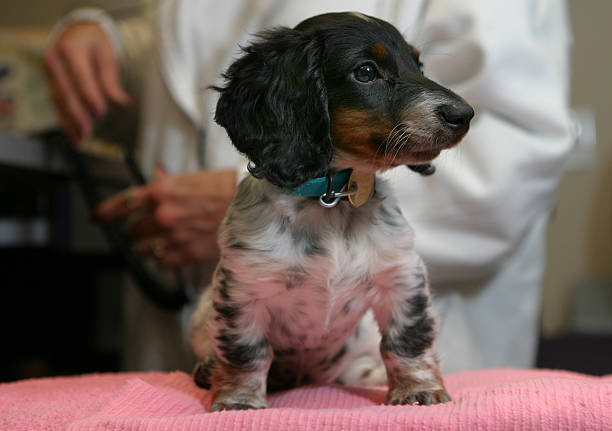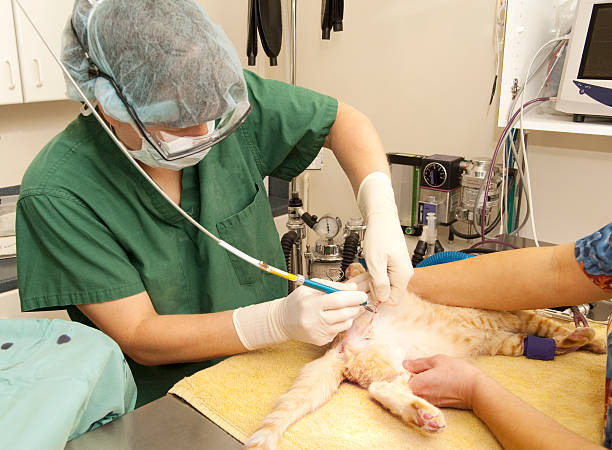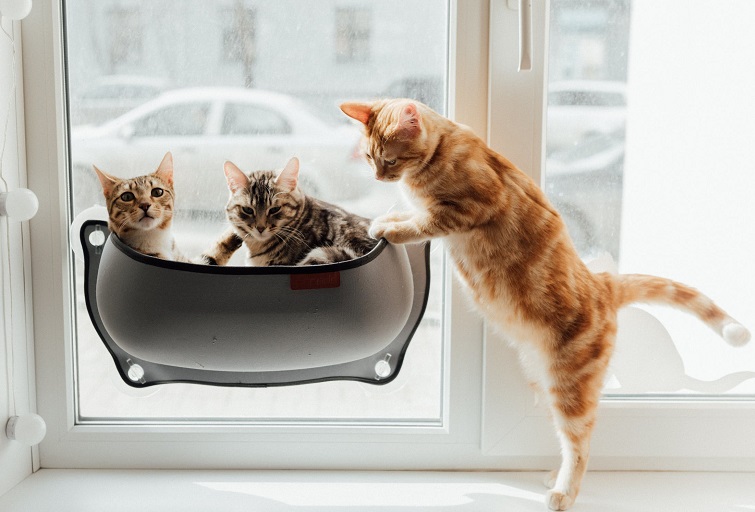Deciding to spay or neuter your pet is incredibly important in offering the best protection for your pet’s health and well-being.
Understandably many pet owners find it difficult to decide whether their pet needs this surgery, so we’ve given you this helpful guide on the decision of spayed or neutered.
Any good veterinarian will recommend your animal is spayed or neutered for many reasons. Not only can it reduce undesirable behaviors but it can also lead to a healthier life and combat the pet overpopulation crisis.
To find out more about the benefits you can get from having your pet spayed or neutered then look no further.
Spay vs. Neuter
There is a big difference between the terms spay and neuter, and the surgery your pet has will depend on their gender.
Both of the terms spaying or neutering mean the same thing, to desex an animal- but the surgery differs depending on the animal.
Neutering is performed on male pets and removes the risk of testicular cancer. A neutered male has fewer unwanted behaviors compared to unneutered animals.
Neutering is also known as castration, and the procedure involves the removal of the dog’s testicles, meaning they cannot impregnate any females and make babies.
Spaying is performed on a female pet and eliminates the risks of breast cancer, and uterine infections, whilst also creating a calmer temperament.

Spaying is when the uterus and ovaries are removed through an incision in your pet’s stomach, and is more complex than neutering so will take longer for a full recovery.
Both spaying and neutering procedures protect your animal from aggression problems, attributes to a longer lifespan, and are a highly cost-effective way to keep your pet happy and healthy.
Both procedures are performed hundreds of times a day on pets all over the world, and in most cases, your pet will be able to come home the same day.
It is recommended that your dog has the surgery when they are younger as there is less chance of age-related complications and risks.
Why Spay and Neuter?
The advantages of spaying or neutering your animal go beyond personal benefit.
Pet Overpopulation
Pets such as cats and dogs can breed many times a year causing a huge rise in their population. Neutering or spaying your pets can also help animal shelters provide the care and support that many homeless animals need without the added strain of a rising population as well.
During breeding season female felines can go into heat every 2-3 weeks, which is why most veterinarians will recommend having a cat spayed at an early age, likely before their first heat.
Male cats can mate all year round from 6-12 months old and can impregnate 6 female cats within two hours.
Female dogs only go into heat around twice a year, but it’s an intact male dog you should be worried about! Unneutered dogs are capable of mating all year round from as young as 6 months old.
Those numbers go to show how important it is to make sure your animals are desexed as there are unprecedented amounts of cats and dogs on the streets as animal rescue shelters aren’t able to keep up with the demand.
Less Aggression
Dogs and cats that have been spayed or neutered are less aggressive and therefore, less likely to fight with other animals!

Medical Benefits
The medical benefits of a neutered male are vast and are considered one of the best ways to help your animals remain fit and healthy. Benefits include:
- Reduced behavioral problems
- Eliminates the risk of testicular cancer
- Reduced chance of prostate problems
The medical advantages for your female pets are impressive too with females being at risk of many medical issues when pregnant. Other benefits of spaying include:
- Prevent uterine infection
- Less unwanted kittens
- Eliminates chances of uterine or ovarian cancer
Behavioral Benefits
Your veterinarian will also recommend your pet is spayed or neutered for behavioral reasons, not just medical! If your pet is known for showing aggression, breaking out of your backyard, or spraying strong-smelling urine around the house then it may be time to consider a trip to the pet clinic!

Neutered cats and dogs are less known for dominance aggression too. This is another reason that desexed animals are known for having a longer life, as their reduced aggression means less chance of fighting or erratic behavior.
When to Spay or Neuter Your Pet
You may think having your animal spayed or neutered wouldn’t make any big difference to their daily life, but the truth is that early neutering is key.
Your veterinarian will recommend the best time for your animals to have the surgery depending on several factors, so make sure to ask when your dogs and cats have their first vaccinations.
For Cats
To prevent unwanted kittens from joining your to-do list, it’s recommended you get your cats spayed or desexed when they are around four months old after their first vaccinations, but sometimes you can have the procedure done at 8 weeks.
Community cats are often sterilized around 6 weeks of age, then released back where they were found to help reduce the amount of overrun shelters.
For Dogs
For dogs, neutering and spaying are recommended between six and nine months of age. If your dog has the surgery done too soon there is an increased risk of injury so ask your veterinarian for more information.
Some dogs could have desexing performed in as little as 8 weeks of age depending on their breed, size, and health.
What Is The Cost To Spay Or Neuter My Dog or Cat?
Sadly one of the biggest reasons pet owners don’t get their pets desexed is the cost. Although it’s not expensive, there are many misconceptions about the cost.
Having your pet sterilized is cost-effective, and much more affordable than having to raise a litter, especially if you have pet insurance.
Neutering your male companion will cost anywhere between $40 and $350 depending on the cat or dog’s age and size.
A low-cost spay can be as little as $50, or up to $500 depending on your female’s size and age, and the clinic you choose.
Ultimately, the cost will vary depending on location and it’s best to contact your local animal services center for a more specific estimate.
Neutering Risks Injury?
No one wants to see their animal suffer which is why many owners may avoid neutering, but truthfully the benefits outweigh the risks.
Sadly, any surgery comes with a risk of complications or long-term implications, but desexing surgery is still recommended by the majority of American veterinarian practices.

If you do decide to wait until your pet is slightly older to avoid some of the associated health risks, then always make sure they are on a leash and in your sight when you’re outside with them.
This is good practice to avoid aggressive mounting behaviors, or unwanted pregnancies in your pets before they reach the recommended age of de-sexing.
You know your pet best of all, so make sure you consider all sides of the story before making your decision as having a pregnant pet is a big responsibility, and raising puppies or kittens is not for everyone.
Male Dog
Performing neuter surgery is usually recommended on dogs around six months of age, but some studies show it can increase the risks of bone cancer if performed before one year of age.
Bone cancer is a much larger risk to medium/large breeds than to smaller dogs, but it is still considered a risk if your animal is neutered too soon.
There is also an increased risk of allergic reactions when receiving vaccinations, as well as obesity. Putting on a few extra pounds is normal in most dogs, but obesity is much more severe.
It is recommended you wait until after your pet has reached puberty to perform neutering surgery so you can avoid a large majority of the health risks that come with early intervention.

Females
Your female pet is also considered to be at much higher risk of bone cancer if spayed before one year of age, as well as many other long-term health risks. Your pet’s chances of obesity can double, as well as urinary incontinence in as much as 20% of all dogs.
Your pet should have a strong food and exercise schedule in place before and after desexing, but make sure they can rest after the surgery.
As with many of the other risks that come with having your animal spayed, you should wait until a veterinarian recommends they are old enough and maybe consider waiting until they are one year or older beforehand to avoid the health risks associated with desexing before puberty.
Helping Your Pet Before and After Surgery
Your pet is going to benefit from having family near to keep a close eye on them before and after surgery, especially if you have been given close instructions to follow.
The vets may recommend you not feed your animal for around 12 hours before the surgery, but these rules may change if it’s for a younger kitten or puppy who can’t go as long without food.
Your veterinarian will also provide information to help you care for your pet afterward, and make sure to ask them plenty of questions so you know the best way to support your pet.
The dreaded “cone of shame” may be placed on your pet to avoid them licking or gnawing at their fresh wound, so make sure you keep this on for at least a few days to allow their body to heal.
Pay attention to the incision site as any new redness inflammation, or weeping is one of the earliest signs of infection and will need immediate treatment to avoid things getting worse.
Make sure your pet has a warm and comfortable “safe spot” indoors that they can recover in without interference from other animals and people, especially other males.
You may want to monitor food intake, but don’t be surprised if your pet isn’t eating loads straight after surgery as they may take some time to start feeling more themselves.
Wait at least 2 weeks before bathing your pets, if not longer as the incision site will still be healing, and bacteria or soap entering the wound can be incredibly painful and delay the healing process.
Finally, make sure your animal cannot roam free. Prepare an enclosed space where they can go to the potty, without the risk of escaping or getting hurt.

Spay/Neuter Myths and Misconceptions
As with any procedure, there is a range of misconceptions surrounding desexing that is not true! Usually, these myths are caused by another contributing factor, and not spaying/ neutering surgery.
The healthier life benefits of sterilization largely outweigh the negatives, so let’s debunk the common myths circling in the pet community.
Obesity is a very unlikely side effect of having your animal spayed or neutered and is usually caused by overfeeding and lack of exercise, still, many owners think the surgery leads to a lazy pet.
As long as your monitor food intake, and provide exercise for your pet then there is no reason for them to become overweight and they will remain healthy.
Spaying or neutering your animal is well known for minimizing unwanted behaviors by reducing their testosterone levels, but if your pet’s behavior problems are caused by their history or personality then it won’t help.
Although desexing is a better option for your pet, it isn’t going to wave a magic wand and erase your animal’s history or personality problems, so it may not be the perfect cure for everything.
The best choice is to consult your vets as they will have a full detailed health history record for your pet, and will be able to tailor their recommendations to enable the best results for your animal.
Conclusion
There are so many decisions to make when it comes to our beloved pets, but desexing your animal whether they’re a cat, dog, or rabbit is a vital step towards a longer life, reduced health risks, and better behavior.
In some cases, you can have help towards the cost of the treatment for your animal, which is a massive help for many and will reduce the overpopulation of animals.
If you’re unsure whether your animal should be desexed then consult your vet who will be able to tell you the ways it can benefit your animal, as well as save you money in the future if your pet was to become a parent unexpectedly!


